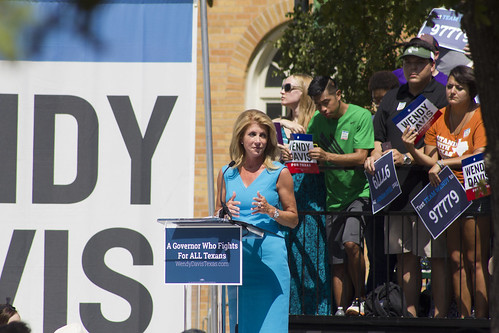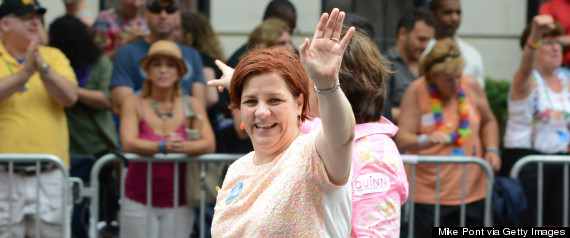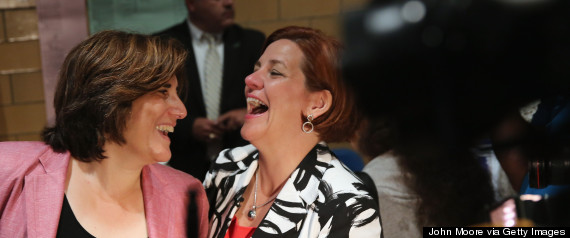GIRLS LOVE THE WAY I FLOSS!!! (FUNNY)LGBT
Had to do it! Much love guys!
Monthly Archives: October 2014
Wendy Davis Rally at University of North Texas

Op-ed: Why We're Still Waiting for Gay Hollywood to Talk About PrEP
Op-ed: Why We're Still Waiting for Gay Hollywood to Talk About PrEP
When will PrEP have its Magic Johnson moment?
Diane Anderson-Minshall
www.advocate.com/31-days-prep/2014/10/31/op-ed-why-were-still-waiting-gay-hollywood-talk-about-prep
No, Being Black and Gay Does Not Suck
No, Being Black and Gay Does Not Suck
Apparently it sucks to be a black gay guy. At least that is what “Stevie” over at gayguys.com claims in his post “20 Reasons It Sucks To Be A Gay Black Man.” I hate this article. I am over articles like this one, which measures our worth as gay men by white men’s standards. Life as a gay black man sucks for Stevie (and all the Stevies of the world) because he is chasing after whiteness.
Stevie’s article mainly consists of reasons such as:
- “Every day I’m consumed with the fear of rejection in a community where muscular white men are looked at in the highest regard.”
- “At least 80% of the guys I meet are ‘not into black guys’. Seriously? You don’t even know me jackass.”
- “Constantly being heart broken because that hot guy I met at Mickey’s doesn’t date black guys…”
- “While LGBT acceptance is making great progress, gay black men still have to hide our sexual orientation from our parents and family.”
Why, Stevie, do so many of your reasons have to do with non-black men validating your desirability? Why, in general, is so much of your worth tied to your body? These are choices you are making. You are choosing to surround yourself, intimately, with people who don’t value blackness. I have always been told, “Birds of a feather flock together.” Perhaps if you truly valued and desired blackness more, it wouldn’t suck so much to be gay and black for you. You would seek out black-affirming spaces and people. Don’t get me wrong: I am not saying you only have to date black guys or have only black friends. What I am saying is that the moment you stop treating whiteness and white boys as the prize, your life changes.
While I know, as a friend of mine says, “love is where you find it,” the unasked questions is: Where the hell have you been looking? Which bodies do you value? I value black bodies that delight in and appreciate blackness. That is, I value folk E. Patrick Johnson would call “quare.” I believe that black men loving black men is a revolutionary act, and I include romantic love and sexual desire in this revolution.
The moment we black folk start valuing ourselves in every way, the moment we stop judging our beauty and our worth by how close we can approximate some white ideal, the moment we see each other as the prize, the moment we chase after blackness as hard as so many of us chase after whiteness, the moment we define for ourselves what it means to be black and gay is the moment life won’t “suck.”
And this is not to be naïve and suggest that there isn’t critical work that needs to be done in the gay community at large, nor am I suggesting that our black heterosexual brothers and sisters don’t have work they need to do, but I am saying that if you continue to live your life based upon the definitions handed to you by whiteness, the rules put into place by whiteness, and the logic that white is right and the only good, then, yeah, life for you will suck. And I’ll have little sympathy for you. Pity, yes, but sympathy? No.
Election 2014: Every Vote Counts
Election 2014: Every Vote Counts

This November 4 is critical in determining the state of the U.S. Congress and creating pathways for the passage of fair-minded policies and legislation.
HRC.org
www.hrc.org/blog/entry/election-2014-every-vote-counts?utm_source=rss&utm_medium=rss-feed
MLB's Torii Hunter Endorses Arkansas Politician for Protecting 'One Man and One Woman' Marriage: AUDIO
MLB's Torii Hunter Endorses Arkansas Politician for Protecting 'One Man and One Woman' Marriage: AUDIO
Earlier this week, Major League Baseball player Torii Hunter released a radio spot, endorsing a politician from his native Arkansas. The politician is Asa Hutchinson (R), who is running for governor.
In the spot, Hunter specifically appeals to Black voters, saying that in Hutchinson’s time as a lawyer, he “fought for more majority African-American districts in the state legislature.” He continues, saying Hutchinson is “committed to the principles we hold dear, like a strong faith in God, equal justice for all, and keeping marriage between one man and one woman.“
As if the above contradiction weren’t blatant enough, Hunter also invokes Martin Luther King in the spot, quoting him in saying “men should be judged by the content of their character.” This is given as a reason for Black voters to not dismiss Hutchinson: Said Hunter: “we too often prejudge political candidates by their party label. I’m asking you to consider Asa for his actions.”
This isn’t the first time Torii Hunter has let his beliefs on gay issues be known; in 2012, he said the thought of playing with a gay athlete made him “uncomfortable,” “as a Christian.”
AFTER THE JUMP is full text of the speech, and the audio embedded:
This is Pine Bluff native and Major League Baseball Player Torii Hunter. I’m asking you to vote for my friend Asa Hutchinson for Governor. Dr. King said that men should be judged by the content of their character. Today we too often prejudge political candidates by their party label. I’m asking you to consider Asa for his actions. As a lawyer, Asa fought for more majority African-American districts in the state legislature. Asa is committed to the principles we hold dear, like a strong faith in God, equal justice for all, and keeping marriage between one man and one woman. Asa wants all children to have access to computer science, to expand charter schools, and bring more jobs and small businesses into our communities. Asa won’t take your vote for granted. Let’s make real change in our community by casting party labels aside and voting our convictions.
[h/t Deadspin]
Jake Folsom
Interview with Fatima Sissoko about LGBT issues
Interview with Fatima Sissoko about LGBT issues
This video was produced by iPadjournos reporters Shakola Walker and Ali Mislowsky. This is the YouTube channel of the iPadJournos project at Virginia Commonwealth University.
WATCH: NOM Targets Ark. Dem. Who Opposes Marriage Equality
WATCH: NOM Targets Ark. Dem. Who Opposes Marriage Equality
Being of two Senate Democrats who don’t support marriage equality isn’t antigay enough for the National Organization for Marriage’s campaign in Arkansas.
Sunnivie Brydum
Christine Quinn On Entering Politics, Why You Should Vote And How She Made Men Listen
Christine Quinn On Entering Politics, Why You Should Vote And How She Made Men Listen
What does it take to get to the top — without losing your center? Our “Making It Work” series profiles successful, dynamic women who are standouts in their fields, peeling back the “hows” of their work and their life, taking away lessons we can all apply to our own.
Christine Quinn has always been open about exactly who she is, and exactly what she wants.
The 48-year-old politician was the third speaker of the New York City Council, holding the position from 2006-2013 — the first female and the first openly gay person to hold that office. She ran for New York City mayor in 2013, conceding the Democratic nomination to Bill de Blasio, but her candidacy amplified conversations about women and gender on the political stage. She bounced back from the race to join the boards of NARAL and Athlete Ally.
In interviews, she’s spoken about her 2011 marriage to her long-term partner Kim Catullo, her struggles with bulimia and alcoholism and how she reconciles her Catholic faith with being a gay woman. But the topic she’s been most outspoken about of late is seeing that women’s rights are taken seriously in New York state.
Quinn is one of the forces behind New York’s Women’s Equality Party (WEP), a party introduced this year that needs 50,000 votes on election day to win permanent ballot status. The stated goal of the WP is to advance the Women’s Equality Agenda, a 10-point package of bills that failed to pass through the New York State Senate. The Women’s Equality Party is somewhat controversial, as critics believe the intention is to pull support away from the Working Families Party, which politicians and prominent voices — Gloria Steinem among them — claim is perfectly capable of addressing women’s issues in a meaningful way.
This criticism hasn’t deterred Quinn from championing the WEP and women’s rights at large. The Huffington Post spoke to Quinn about what it’s like being a woman in politics, the power of the vote and the advice she’d offer others. Here’s what she had to say:
What inspired you to get into politics? Were you always interested in running for office?
The thing that inspired me to get into politics, interestingly enough, was the library at my elementary school. I went to my local parish elementary that had a great little library, and it had this section that had all of the paperback biographies of famous women, and trailblazers — Eleanor Roosevelt, and other great leaders who happened to be men. I read them until they were dog-eared. To me, they were just amazing. There was an opportunity, through the work these trailblazers did — you could change things, you could make things better. All I wanted to do was that kind of work.
Did you find that being a woman made it harder to run OR harder to be taken seriously?
It’s hard to answer that question in any scientific way, wondering did my gender or sexual orientation have negative impact at any point in my career, because you just keep going. When you’re in a meeting and someone is not paying attention to you, they’re paying attention to the men in the meeting, you just keep going. You make it clear to that person that it’s not acceptable. I used to take my paperwork out of my briefcase and be like, “If you’re not going to look at me, I might as well get something else done!”
The truth is, there aren’t really any professions out there right now where… women or LGBT people [aren’t challenged in some way]. That’s reality. But you can’t wallow in the problem. You gotta move forward for yourself, to find a solution, and you have to move forward for the larger society’s solutions. And that’s what the Women’s Equality Party is about, what my career in politics and government is about, is pushing through — finding a way through and then finding solutions so that those of us coming through after don’t have to fight as hard or push up a steeper hill. That’s what all the women who came before have done as well.

Quinn marching in the 2013 New York Pride Parade
So, what should voters know about the Women’s Equality Party (WEP)? How did you get involved with it?
I was involved in efforts around the Women’s Equality Act, which is the 10-point agenda we’ve been pushing for a while to get passed and enacted in Albany. That agenda covered pay equity, stronger protection for domestic violence survivors, stronger protection for human trafficking victims, codifying Roe vs. Wade and a law that would prevent women from being discriminated against at work if they are pregnant. I was obviously very supportive of the act when I was speaker of the council, and I was thrilled when Governor Cuomo made it a central part of his State address.
I joined the board of the New York State NARAL, where the women’s equality agenda is one of our highest priorities. So many New Yorkers were outraged when the act didn’t get passed, when the Senate thought it was OK to leave Albany with unfinished business for women and girls. I was outraged! And one of the reasons I joined the NARAL board was to keep pushing to get the act passed. So when there was this decision to create a ballot line, a party to move this act even further forward, I jumped at an opportunity to be a part of it. Because it’s now an additional way to flex women’s muscles around this political issue. We need to get the job done on this. We need even more political muscle, we need even more entities out there fighting to get this done, expand the team that’s working on it. That’s what we’re doing here, and I hope when we’re done next Tuesday, people see the message in Albany loud and clear. Women’s issues aren’t going to be “other” any more. There is another political entity in town that is going to hold you accountable.
Some have said that the Women’s Equality Party is trying to undermine the Working Families Party.
Nothing could be further from the truth. And early days at the Working Families Party, I was an elected official; I supported their creation. I heard the same thing then from my democratic officials, my district elders. “What are you doing! You can’t support the creation of a new party, it’s going to kill the Democratic Party!” I disregarded that then, and all that fear did not come to fruition. And that’s the same thing here. I think we’re all extremely grateful to the WFP for the ways they have fought on the issues for working families in the city, and they have been very successful. I think it’s great that the Women’s Equality Act is part of their platform. But, we didn’t get it done in Albany — we being everyone who was part of the team. We need more muscle. And that’s why I know, when the WEP comes together, it’s going to help strengthen and support the Democratic Party, the choice movement, the pay equity movement, and the working families party. This is not about “instead of,” this is about “in addition to.”

Quinn (R) and her partner Kim Catullo before casting their votes in the 2013 primary for NYC mayor
Obviously, there are a lot of different issues affecting women that are coming up in this election. Pay equity, reproductive rights, etc. What can women do to change things?
Firstly, vote. Elect officials supporting the full 10 points on the Women’s Equality Plan. Then pick up the phone to your elected officials, or the people running in your area, and tell them “I’m voting for you only because you’re for women’s equality,” or “I’m not voting for you because you don’t support a women’s equality plan.” Go to NARAL, or Planned Parenthood, or other groups in your town — get on a list, so that after Tuesday, you’ll know what changes are happening. What funds are classed, when are the rallies, when is the lobbying? You can be a part of that, to help make sure people know what their voters care about. You’re a voter who voted on this, and you’re not going away.
What advice would you offer young women who may be interested in going into politics?
The first thing I would tell young women — or young men for that matter — is that there’s a need for all kinds of people and skills in politics. If you are interested in politics but think “I don’t like talking in public or being the front person,” that’s OK. Because we need people who are interested in organizing press conferences, being researchers, being social media gurus, and so on. Any skill set you have, trust me, there’s a need for it in politics. Two, if you’re a woman and you’re interested in being involved in politics, we need you. We need more young women to get out there and get involved. It can be rough and tumble, and difficult, but there really is a terrific balance of elected women out there who do support each other and work together — and people should know that exists. And finally, be yourself. Whatever dress you wear, whatever shoes, someone’s gonna have something to say about it, so just be who you are, do what you want, and have fun.
Who were your role models growing up? Do you have women in politics who mentor and support you today?
I think right now in politics, we’re all so lucky to have Hillary Clinton do everything she’s done and continue to be out there. Every time I see her, she is so maternal, and supportive and encouraging to me and has always gone out of her way to be helpful. I am so grateful to her for that. She does that for lots of young women who are out there working right now.
Will you be voting on November 4th? We want to know! Join the conversation on Twitter or Instagram using the hashtag #WhyImVoting.
School District in Texas Adds Protections for Transgender Employees and Students
School District in Texas Adds Protections for Transgender Employees and Students

This week, the Austin Independent School District (AISD) added gender identity to the district’s non-discrimination policy to protect transgender employees and students.
HRC.org
